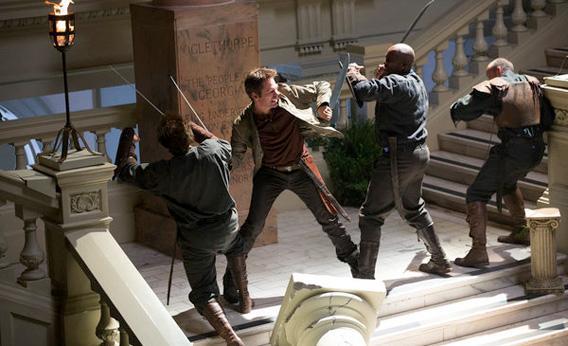The post-apocalyptic drama Revolution (NBC, Mondays at 10 p.m. ET) opens with “The Blackout.” One night, all the power goes out, everywhere in the world, in a big-picture way, with every basic backup generator and homely electrochemical cell rendered impotent such that even those citizens capable of remembering where they put the goshdarn flashlight would find it useless. On the bright side, no one is in danger of having to watch this inert action show.
Perhaps only one true-hearted American, a Chicagoan named Ben Matheson, has some foreknowledge of the show’s premise. We see Ben rushing home to his family, placing a frantic phone call to his military-officer brother, fiddling with a talisman of a flash drive—and shortly allowing his moppet of a young daughter to pig out on ice cream because, hey, the freezer done broke.
After a commercial break, it is 15 years later, and the lights still have not come back on. The U.S. government has toppled, militias have risen to fill the power void, and the Revolution crew has made but a token effort to depict the ravages visited upon humanity, showing us a Wrigley Field overgrown with weeds and a hatchback used as decorative planters. “Physics went insane … and nobody knows why,” Ben’s pal Aaron (played by Zak Orth) says to a group of kids at an ad hoc little schoolhouse on the prairie. That “nobody,” one fears, includes the series’ creator, J.J. Abrams, whose Lost went infamously astray and whose Alcatraz—about inmates escaping the island prison through a tear in the fabric of time—never even got a chance to go nowhere.
But Revolution will most directly remind the audience of two recent flops that otherwise would have soon disappeared from memory—Terra Nova (about people from the future roughing it in the prehistoric past) and The Event (about nobody-ever-figured-out-what). Lonely rebels struggle against shadowy conspiracies and shady narrative logic. Fight scenes arrive with such a programmatic regularity that you could set your watch by them—and then watch the seconds tick away while wondering why it should be that TV’s squarest network (CBS, home of Hawaii Five-0 and Abrams’ Person of Interest) airs its most roundly satisfying action sequences.
Over the 15 years of The Blackout, Ben’s daughter, Charlie, develops into a lithe young survivalist. As played by Tracy Spiridakos, she wears a cropped leather jacket over a tank top, a crossbow over the jacket, and a look of wounded fury in the pale eyes above her Fiona Apple cheeks. His son, Danny (Graham Rogers), has unfortunately missed his calling as a Hollister model, but his brooding nonetheless brightens our dim future. These improbably well-groomed youths discover their common calling when the forces of evil come into town in the form of Giancarlo Esposito, who underplays his part as a working stiff turned cavalry officer.
When Esposito’s militia captain—somehow strutting on horseback—tries to bring Ben in for a chat with a warlord, Danny acts impulsively, Ben gets shot, and the plot lurches into motion. The lad finds himself taken prisoner, and the lass finds herself heading back to sweet home Chicago, where she must track down her uncle (Billy Burke) and alert him of a job opening for a rugged rebel leader. She is chaperoned by a stepmom figure with a medical degree and a British accent—and by nebbishy Aaron, a fellow sketched with a livelier hand than many of other characters here, despite his burden of har-de-har gags in search of lost time. While wearing an AC/DC T-shirt, he has occasion to mention the $80 million he won back when there was a tech industry: “I used to work at this place called Google.” To which Charlie says, “That was a computer thing, right?” If this sounds thin as comic relief, well, consider the drama that it is relieving, a series that—attempting to gratify the Hunger Games-stoked appetites of teens while also sating their parents’ thirst for serial intrigue—serves up thin gruel indeed.
